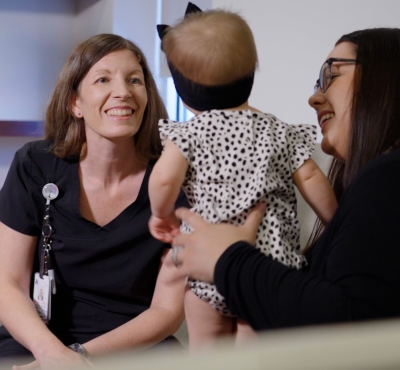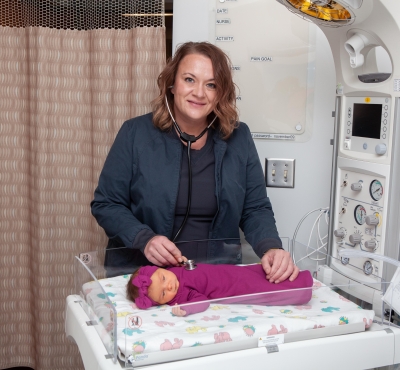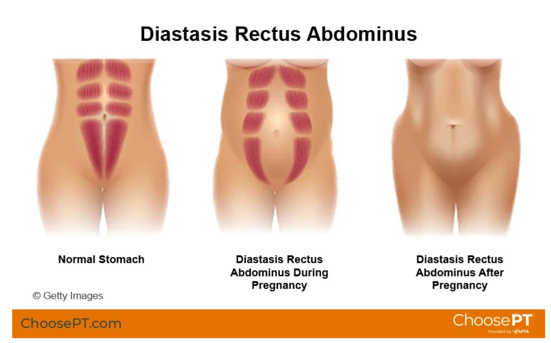Butler County Health’s passionate staff is dedicated to providing exceptional care for both moms and babies. We combine the expertise of a large obstetric facility with the warmth and attention to detail of a small facility. Experience the joy of seeing your little one with our advanced 4-D ultrasound technology, ensure your comfort during labor and delivery with our anesthesia services and welcome your little one in our family-oriented labor and delivery suite.
Childbirth Education Online Class
Can’t fit a childbirth class into your busy schedule or prefer to learn online at your own pace? We’ll bring the class to you! The Understanding Birth eClass is your go-to guide for answers you can trust on childbirth. This interactive online course covers essential information on labor and more and highlights ways partners can help. You’ll also get a sense of what labor is really like as you watch several birth stories. You’ll even have an opportunity to create your own birth plan.
You can access the eClass from any computer or mobile device with an Internet connection. Allow 6-8 hours to complete. The Understanding Birth eClass covers topics such as: Pregnancy, Labor, Birth Stories, Comfort Techniques, Medical Procedures, Cesarean Birth, Newborns and Postpartum.
The class offered at no charge to those delivering at Butler County Health. To register for Understanding Birth eClass, contact Yenni Schroeder at 402.367.1206.
Preregistration
Preregistration is recommended at 36 weeks. To preregister please call the Outpatient Services to schedule an appointment at 402.367.1375.
Doctor Approved Medication
Talk to your provider prior to taking any current or new medication during pregnancy. Some safe and approved doctors medications include Tylenol (for pain or fever); Anything OTC Pepcid (for heartburn); Robitussin (cough and congestion); Claritin, Tylenol, or plain Sudafed (for congestion); Benadryl, Claritin, Claritin-D, or pseudoephedrine (for allergies); Colace or Miralax (for constipation); ginger snaps, ginger tea, ginger cookies, ginger ale, or vitamin B6 (for nausea). For depression or anxiety medication, ask your provider if your antidepressant is safe to continue.
Proper Nutrition and Fluid Intake
Nutrition is crucial for both you and your baby during pregnancy, but maintaining a balanced diet can be challenging with certain restrictions. Consider talking with BCH dietician Sandra Burwell for more information about nutrition or visit myplate.gov to create a personalized nutrition plan.
Better Your Sleep
Sleep during pregnancy can be difficult, especially if you normally like to sleep on your back or stomach. Getting restful sleep is important during your pregnancy; we are here to help you with some tips and tricks. Safe sleep positions during pregnancy include sideline sleep, reclined supine sleep, or a semi-supine position.
Sideline Reclined Supine Semi-supine
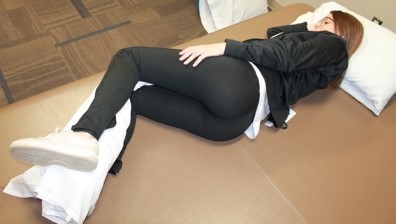
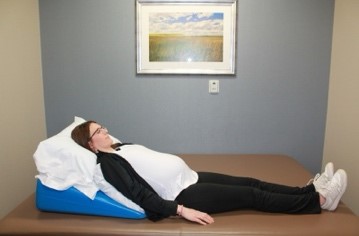
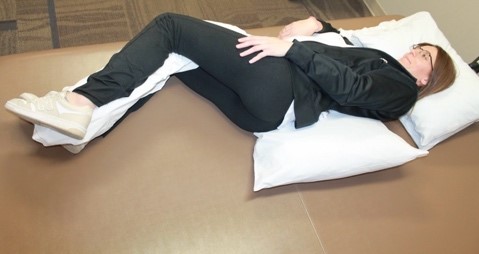
Exercising During Pregnancy
Exercise supports both physical and mental health. If you exercised before pregnancy, you can usually continue your routine—just avoid adding intense new workouts. If you’re new to exercise, talk to your healthcare provider about starting safely; walking is a great option. Always check with your provider before exercising for two, and avoid risky activities like horseback riding, scuba diving, and contact sports.
Support your Mental Health
Motherhood is a big adjustment that can bring stress, anxiety, or depression. These feelings are normal, but you don’t have to face them alone. BCH is here to support your mental health during this transition. Reach out to your healthcare provider with any questions or concerns. Screen your mental health by going to Mental Health America and selecting the “take a mental health test” tab.
Medical Conditions During Pregnancy
During your pregnancy you could be faced with different medical conditions. Talk to your primary care provider about any questions or concerns related to any of these medical conditions and identify if you may be at risk. Some of these conditions include preeclampsia, chronic high blood pressure, gestational diabetes, anemia, hyperemesis gravidarum.

